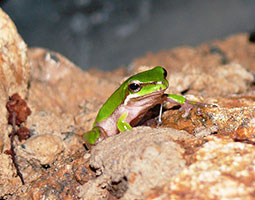Litoria fallax
Description

The Eastern Sedge-frog, sometimes called the Dwarf Tree Frog, is a small species of tree frog approximately 3 centimetres in length. It can vary considerably in colour from pale brown to green, with a distinctive white jaw strip and dark band that runs between the nostril and eye, and a bright orange thigh. It is common in suburban gardens on the Queensland coast, particularly when there is a source of water nearby.
Up to 300 eggs are laid by females in spring and summer on the surface of the water in amongst the vegetation. Individual clumps of frog spawn usually only contain up to 35 eggs. Tadpoles have dark tails with pale or patterned bodies, and can reach 55 millimetres in length.
Adaptations
- Changing colouration gives them excellent camouflage in vegetation
- Large eyes enable them to see at night
- Discs on toes help them to climb almost any surface
- Females lay eggs in small clumps in many different locations to improve the chances of eggs hatching into tadpoles and tadpoles surviving to become adult frogs
Feeding relationships
- What I eat: as a tadpole - algae; as a frog — small invertebrates
- What eats me: as a tadpole — fish, birds, water spiders and dragonfly larvae; as a frog — snakes (e.g. Green Tree Snake & Red-bellied Black Snake); birds (e.g. Herons, Kingfishers, Egrets); lizards (e.g. Water Dragon, Golden Water Skink); other frogs (e.g. Green Tree Frog)
Interesting facts
Eastern Sedge-frogs are sometimes called ‘banana frogs’ because they quite often turn up in fruit shops as accidental stowaways, travelling long distances from their usual habitat.